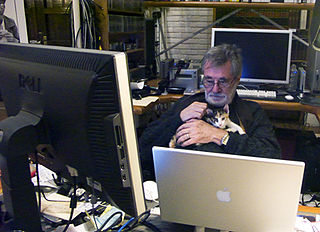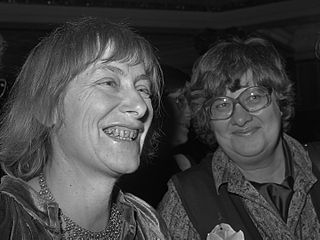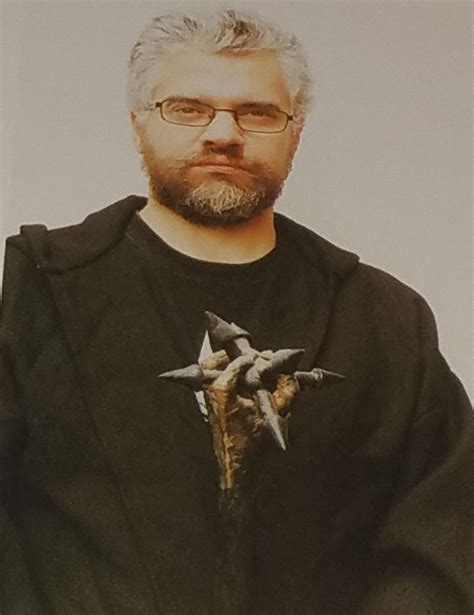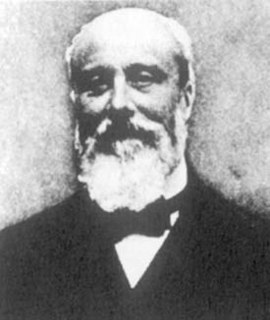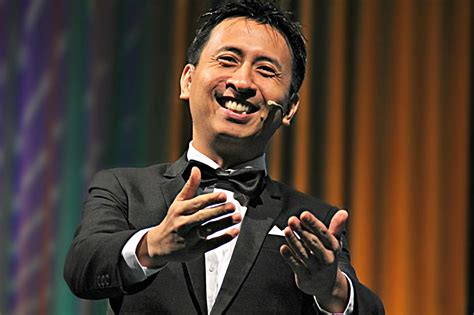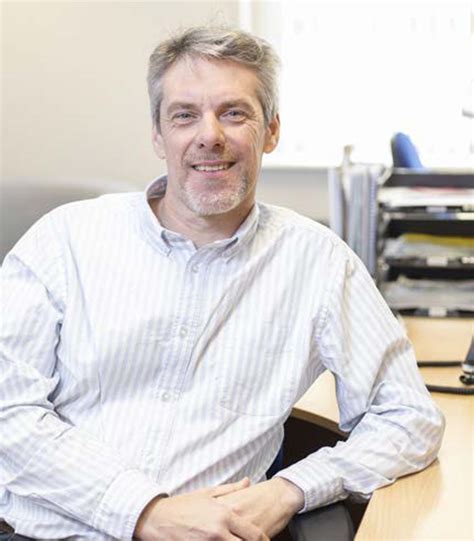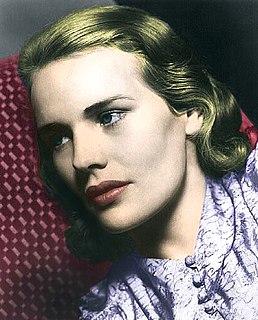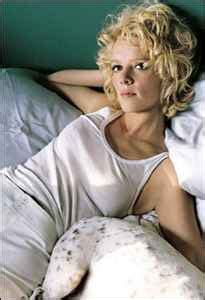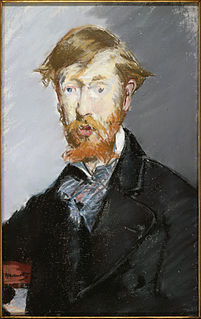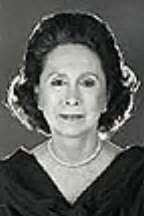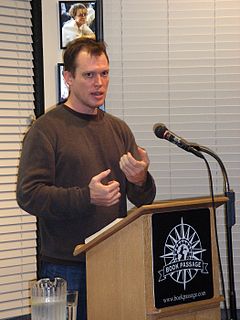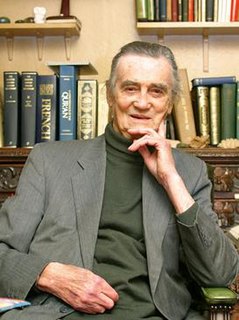Top 1200 Augmented Reality Quotes & Sayings - Page 19
Explore popular Augmented Reality quotes.
Last updated on November 8, 2024.
Before, the myth of photography doesn't lie was used in order to cover up tricks. If I [make a] portrait [of] you, accommodate you, illuminate you, put make up on you or use a filter, am I not manipulating reality? The only difference is that now I can do it from the computer in the postclick instead of the preclick. If I decide to photograph something instead of something else, I also manipulate reality. Of course a photograph can lie or commit abuse, but it always could.
If a man does not keep pace with his companions, perhaps it is because he hears a different drummer. Let him step to the music which he hears, however measured or far away. It is not important that he should mature as soon as an apple-tree or oak. Shall he turn his spring into summer? If the condition of things which we were made for is not yet, what were any reality which we can substitute? We will not be shipwrecked on a vain reality.
Every acceptance of suffering is an acceptance of that which exists. The denial of every form of suffering can result in a flight from reality in which contact with reality becomes ever thinner, ever more fragmentary. It is impossible to remove oneself totally from suffering, unless one removes oneself from life itself, no longer enters into relationships, makes oneself invulnerable.
Magic is a set of techniques and approaches which can be used to extend the limits of Achievable Reality. Our sense of Achievable Reality is the limitations which we believe bind us into a narrow range of actions and successes - what we believe to be possible for us at any one time. In this context, the purpose of magic is to simultaneously explore those boundaries and attempt to push them back - to widen the 'sphere' of possible action.
Retreat is a response to the call of the heart-that call which beckons us toward reality, to the truth of our being, to that which is truly sane, really real and liberating ... When a group of people come together as a response to that kind of inward call, it creates a very powerful environment, where truth is held in the highest esteem and the reality of our being responds to that deepest intention.
There is something which unites magic and applied science (technology) while separating them from the "wisdom" of earlier ages. For the wise men of old, the cardinal problem of human life was how to conform the soul to objective reality, and the solution was wisdom, self-discipline , and virtue. For the modern, the cardinal problem is how to conform reality to the wishes of man, and the solution is a technique.
There are three bombs. The first one is the atomic bomb, which disintegrates reality, the second one is the digital or computer bomb, which destroys the principle of reality itself - not the actual object - and rebuilds it, and finally the third bomb is the demographic one. Some experts have found out that in five thousand years from now, the weight of the population will be heavier than the weight of the planet. That means that humanity will constitute a planet of its own!
One thing is certain: The power of belief, the power of thought, will move reality in the direction of what we believe and conceive of it. If you really believe you can do something, you can. This is a fact. When you clearly envision a victorious outcome, engrave it in your heart and are firmly convinced that you will attain it, your brain makes every effort to realize the mental image you have created. And then, through your unceasing efforts, that victory is finally made a reality.
That all opposites—such as mass and energy, subject and object, life and death—are so much each other that they are perfectly inseparable, still strikes most of us as hard to believe. But this is only because we accept as real the boundary line between the opposites. It is, recall, the boundaries themselves which create the seeming existence of separate opposites. To put it plainly, to say that "ultimate reality is a unity of opposites" is actually to say that in ultimate reality there are no boundaries. Anywhere.
Now these two questions Does there exist a material reality distinct from sensible appearances? and What is the nature of reality? do not have their source in experimental method, which is acquainted only with sensible appearances and can discover nothing beyond them. The resolution of these questions transcends the methods used by physics; it is the object of metaphysics. Therefore, if the aim of physical theories is to explain experimental laws, theoretical physics is not an autonomous science; it is subordinate to metaphysics.
We lie to ourselves and try to escape that bitter reality by saying that the world is divided into good guys and bad guys, and that we're the good guys. We condemn people as evil to reassure us that we're not like them. If there's to be any hope of preventing these things from happening again, we have to look at the reality. That any act of evil in our history was committed by human beings like us. That, very often, we're all implicated in it.
I have to tell it again and again: I have no doctrine. I only point out something. I point out reality, I point out something in reality which has not or too little been seen. I take him who listens to me at his hand and lead him to the window. I push open the window and point outside. I have no doctrine, I carry on a dialogue.
There are only two worlds - your world, which is the real world, and other worlds, the fantasy. Worlds like this are worlds of the human imagination: their reality, or lack of reality, is not important. What is important is that they are there. these worlds provide an alternative. Provide an escape. Provide a threat. Provide a dream, and power; provide refuge, and pain. They give your world meaning. They do not exist; and thus they are all that matters.
Beginning with Santa Claus as a cognitive exercise, a child is encouraged to share the same idea of reality as his peers. Even if that reality is patently invented and ludicrous, belief is encouraged with gifts that support and promote the common cultural lies. The greatest consensus in modern society is our traffic systems. The way a flood of strangers can interact, sharing a path, almost all of them traveling without incident. It only takes one dissenting driver to create anarchy.
I think we create our world through stories. We use storytelling to escape or protect ourselves from the unimaginable and the horrible - from the real, in a way. It's like white light - if you put everyday reality through a prism you get this rainbow of colors that you couldn't see before. I'm interested in exploring the world to show the things that are invisible. And not just undocumented aspects of reality, but to actually make manifest things that have been hitherto invisible through the intervention of filmmaking.
There's a diversion between economic reality - integration, global village, everybody depending on everybody else - and cultural reality, which is people feeling invaded, undermined, threatened, wanting to have "stand-your-ground" legislation all over the place. It's alarming because at the moment, the fear is outweighing the benefits, and that's partially because the benefits have been so unequally distributed that lots of people don't feel better off. They feel threatened, angry and despairing.
No other technique for the conduct of life attaches the individual so firmly to reality as laying emphasis on work; for his work at least gives him a secure place in a portion of reality, in the human community. The possibility it offers of displacing a large amount of libidinal components, whether narcissistic, aggressive or even erotic, on to professional work and on to the human relations connected with it lends it a value by no means second to what it enjoys as something indispensable to the preservation and justification of existence in society.
The process [of mass-media deception] has to be conscious, or it would not be carried out with sufficient precision, but it also has to be unconscious, or it would bring with it a feeling of falsity and hence of guilt.... To tell deliberate lies while genuinely believing in them, to forget any fact that has become inconvenient, and then, when it becomes necessary again, to draw it back from oblivion for just so long as it is needed, to deny the existence of objective reality and all the while to take account of the reality which one denies all this is indispensably necessary.
Literary science fiction is a very, very narrow band of the publishing business. I love science fiction in more of a pop-culture sense. And by the way, the line between science fiction and reality has blurred a lot in my life doing deep ocean expeditions and working on actual space projects and so on. So I tend to be more fascinated by the reality of the science-fiction world in which we live.
Thought creates things by slicing up reality into small bits that it can easily grasp. Thus when you are think-ing you are thing-ing. Thought does not report things, it distorts reality to create things, and as Bergson noted, "In so doing it allows what is the very essence of the real to escape." Thus to the extent we actually imagine a world of discrete and separate things, conceptions have become perceptions, and we have in this manner populated our universe with nothing but ghosts.
Steve Grand is the creator of what I think is the nearest approach to artificial life so far, and his first book, Creation: Life and How to Make It, is as interesting as you would expect. But he illuminates more than just the properties of life: his originality extends to matter itself and the very nature of reality. Not since David Deutsch's The Fabric of Reality have I encountered such a compelling invitation to think everything out afresh, from the bottom up.
If, on thinking this, I look up to see if reality can quench my thirst, I see inexpressive facades, inexpressive faces, inexpressive gestures. Stones, bodies, ideas - all dead. All movements are one great standstill. Nothing means anything to me, not because it's unfamiliar but because I don't know what it is. The world has slipped away. And in the bottom of my soul - as the only reality of this moment - there's an intense and invisible grief, a sadness like the sound of someone crying in a dark room.
This harmony that human intelligence believes it discovers in nature - does it exist apart from that intelligence? No, without doubt, a reality completely independent of the spirit which conceives it, sees it or feels it, is an impossibility. A world so exterior as that, even if it existed, would be forever inaccessible to us. But what we call objective reality is, in the last analysis, that which is common to several thinking beings, and could be common to all; this common part, we will see, can be nothing but the harmony expressed by mathematical laws.
Even the absurdest report may in nearly every instance be traced to an actual occurrence; and had there been no such actual occurrence, this preposterous misrepresentation of it would never have existed. Though the distorted or magnified image transmitted to us through the refracting medium of rumour, is utterly unlike the reality; yet in the absence of the reality there would have been no distorted or magnified image.
If you deny any affinity with another person or kind of person, if you declare it to be wholly different from yourself - as men have done to women, and class has done to class, and nation has done to nation - you may hate it or deify it; but in either case you have denied its spiritual equality and its human reality. You have made it into a thing, to which the only possible relationship is a power relationship. And thus you have fatally impoverished your own reality.
I favour an interpretation of quantum mechanics (the 'Everett interpretation') according to which reality branches in any chancy quantum situation. On this view, Schrödinger's set-up will give rise to in two future branches of reality, one with a live cat, and one with a dead cat - and the talk of '50% chances' just indicates that the two branches are both equally real futures of the cat that originally entered the box.
Photography has almost no reality; it is almost a hundred per cent picture. And painting always has reality: you can touch the paint; it has presence; but it always yields a picture - no matter whether good or bad. That's all the theory. It's no good. I once took some small photographs and then smeared them with paint. That partly resolved the problem, and it's really good - better than anything I could ever say on the subject.
Objects and their functions no longer had any significance. All I perceived was perception itself, the hell of forms and figures devoid of human emotion and detached from the reality of my unreal environment. I was an instrument in a virtual world that constantly renewed its own meaningless image in a living world that was itself perceived outside of nature. And since the appearance of things was no longer definitive but limitless, this paradisiacal awareness freed me from the reality external to myself. The fire and the rose, as it were, became one.
That’s what the human brain is there for—to turn the chaos of given experience into a set of manageable symbols. Sometimes the symbols correspond fairly closely to some of the aspects of the external reality behind our experience; then you have science and common sense. Sometimes, on the contrary, the symbols have almost no connection with external reality; then you have paranoia and delirium. More often there’s a mixture, part realistic and part fantastic; that’s religion.
... Nothing resembles reality less than the photograph. Nothing resembles substance less than its shadow. To convey the meaning of something substantial you have to use not a shadow but a sign, not the limitation but the image. The image is a new and different reality, and of course it does not convey an impression of some object, but the mind of the subject; and that is something else again.
Many, and I think the determining, constitutive facts remain outside the reach of the operational concept. And by virtue of this limitation this methodological injunction against transitive concepts which might show the facts in their true light and call them by their true name the descriptive analysis of the facts blocks the apprehension of facts and becomes an element of the ideology that sustains the facts. Proclaiming the existing social reality as its own norm, this sociology fortifies in the individuals the "faithless faith" in the reality whose victims they are.
I had lines inside me, a string of guiding lights. I had language. Fiction and poetry are doses, medicines. What they heal is the rupture reality makes on the imagination. I had been damaged, and a very important part of me had been destroyed - that was my reality, the facts of my life. But on the other side of the facts was who I could be, how I could feel. And as long as I had words for that, images for that, stories for that, then I wasn't lost.
We have reversed the usual classical notion that the independent "elementary parts" of the world are the fundamental reality, and that the various systems are merely particular contingent forms and arrangements of these parts. Rather, we say that inseparable quantum interconnectedness of the whole universe is the fundamental reality, and that relatively independent behaving parts are merely particular and contingent forms within this whole.
Most people look at a feature film and say, "It's just a movie." For me there is no border or wall between fiction and documentary filmmaking. In documentaries, you have to deal with real people and their real feelings - you are working with real laughter, happiness, sadness. To try to reflect the reality is not the same as reality itself. That's why I think that making a good documentary is much harder than making a good feature film.
Evolution is the only thing that exists through time. That is true for computers, or people, or a business. We tend to see things in a static way, and so you see what is. Even in looking at ourselves, what we really are is essentially vessels for our DNA that keeps evolving through time. So seeing that and embracing that reality, and thinking of everything as kind of this perpetual motion machine in which you embrace reality - you don't wish it was different. You realize that it's your puzzle to interact with. You interact with it well, you evolve yourself.
The songs are not meant to be real life. They're meant to have a psychic - rather than a factual - bearing on the listener. It's rare that a song grounded in reality moves me because I don't feel like I'm getting the whole story. Songs are made to exist in and of themselves, like a great James Jones or Robert Louis Stevenson novel - they're not autobiographical, and yet there's a reality in every single page. It's real life of the imagination.
I started in documentaries. I started alone with a camera. Alone. Totally alone. Shooting, editing short documentaries for a French-Canadian part of CBC. So to deal with the camera alone, to approach reality alone, meant so much. I made a few dozen small documentaries, and that was the birth of a way to approach reality with a camera.
Homosexual feelings are controllable. Perhaps there is an inclination or susceptibility to such feelings that is a reality for some and not a reality for others. But out of such susceptibilities come feelings, and feelings are controllable. If we cater to the feelings, they increase the power of the temptation. If we yield to the temptation, we have committed sinful behavior. That pattern is the same for a person that covets someone else's property and has a strong temptation to steal. It's the same for a person that develops a taste for alcohol.
If one admits that the influence of the outside world is essentially beneficial, the lack of such influence during sleep would tend to diminish the value of our dream activity so as to render it inferior to the mental activity that takes place when we are awake, when we are exposed to these beneficial influences of surrounding reality. But how can one say that the influence of reality is exclusively beneficial. Could it not also be damaging, and could its absence not give access to qualities superior to those that we have when awake?
There are sacred moments in life when we experience in rational and very direct ways that separation, the boundary between ourselves and other people and between ourselves and Nature, is illusion. Oneness is reality. We can experience that stasis is illusory and that reality is continual flux and change on very subtle and also on gross levels of perception . . . When people bother you in any way, it is because their souls are trying to get your divine attention and your blessing.
Thus, the question of how and when to start vagabonding is not really a question at all. Vagabonding starts now. Even if the practical reality of travel is still months or years away, vagabonding begins the moment you stop making excuses, start saving money, and begin to look at maps with the narcotic tingle of possibility. From here, the reality of vagabonding comes into sharper focus as you adjust your worldview and begin to embrace the exhilarating uncertainty that true travel promises.
Through the present moment, you have access to the power of life itself, that which has traditionally been called "God." As soon as you turn away from it, God ceases to be a reality in your life, and all you are left with is the mental concept of God, which some people believe in and others deny. Even belief in God is only a poor substitute for the living reality of God manifesting every moment of your life.
The subconscious mind makes no distinction between constructive and destructive thought impulses. It works with the material we feed it, through our thought impulses. The subconscious mind will translate into reality a thought driven by fear, just as readily as it will translate into reality a thought driven by courage or faith.
I think that Donald Trump successfully mobilized a big chunk of America to vote for him and he's going to win. He has won. He's going to be the next president and regardless of what experience or assumptions he brought to the office, this office has a way of waking you up and those - those aspects of his positions or predispositions that don't match up with reality, he will find shaken up pretty quick because reality has a way of asserting itself.
Falsehood, like a drawing in perspective, will not bear to be examined in every point of view, because it is a good imitation of truth, as a perspective is of the reality, only in one. But truth, like that reality of which the perspective is the representation, will bear to be scrutinized in all points of view, and though examined under every situation, is one and the same.
The writer loves the fog as it pours in; he loves the sun when the fog pours out. The rest of California is Beach Boys country, but San Francisco has that moody thing going on, those blues notes wrapped in moisture, an atmosphere that tempers California dreaming and makes life more real. The fog brings reality, but it is still a California reality, one spent outdoors the whole year round.
A performer may be taken in by his own act, convinced at the moment that the impression of reality which he fosters is the one and only reality. In such cases we have a sense in which the performer comes to be his own audience; he comes to be performer and observer of the same show. Presumably he introcepts or incorporates the standards he attempts to maintain in the presence of others so that even in their absence his conscience requires him to act in a socially proper way.
We have had philosophies, we have ideologies, we have so many kinds of enterprises but despite that there are so many differences and the differences are having larger and larger gaps. If it is the truth, it has to be the truth for everyone. Everyone has to say: "This is The Truth". But it has to be the Absolute Truth. If it is not the Absolute Truth than what we believe into is not the reality. And this is the main reason why everything in the name of God, Divinity, everything has failed so far because it is not substantiated by reality.
Those who know in their hearts that they are not really necessary -- and are entirely replaceable-- must inevitably be tempted to misrepresent the nature of their work and build up a false notion of its importance. A further alienation from truth takes place, a further loss of contact with reality. And one thing we can be sure of is that self-deception, whether on the level of the wind and the rain or on that of spiritual reality, must always come up against the real sooner or later, and that its destruction is very painful.
If you read Calvin, for example, he says, How do we know that we are godlike, in the image of God? Well, look at how brilliant we are. Look how we can solve problems even dreaming, which I think is true, which I've done myself. So instead of having an externalized model of reality with an objective structure, it has a model of reality that is basically continuously renegotiated in human perception. I think that view of things is pretty pervasively influential in Protestant thought.
